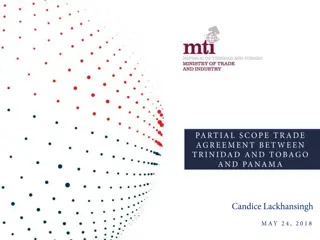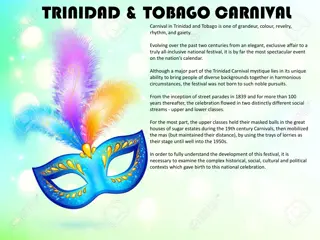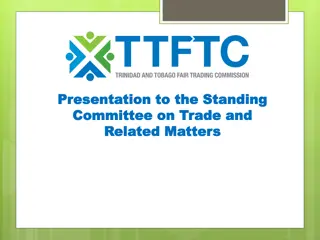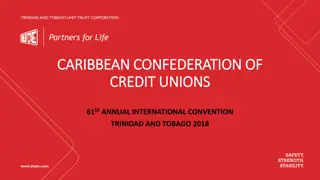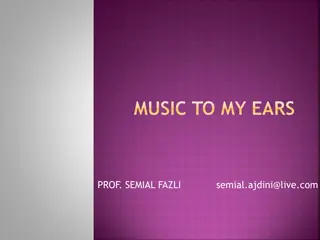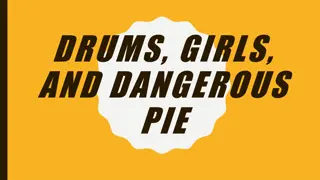The Vibrant World of Steel Drums in Trinidad and Tobago
Everywhere you go on the island of Trinidad and Tobago, you can't escape the sound of the steel drum. It's native to the island and an integral part of its culture, originating from oil drums that were repurposed into musical instruments during the Second World War. The music of the region is rooted in history, brought over by African people. Today, people enjoy playing the drums both by reading music and by ear in places known as pan yards, immersing themselves in the country's musical heritage.
Download Presentation

Please find below an Image/Link to download the presentation.
The content on the website is provided AS IS for your information and personal use only. It may not be sold, licensed, or shared on other websites without obtaining consent from the author. Download presentation by click this link. If you encounter any issues during the download, it is possible that the publisher has removed the file from their server.
E N D
Presentation Transcript
Unit 6 F ( video) Steel drums
Before you watch Where you think these people are from What kind of musical instrument they are playing? Why you think this music is important to them
While you watch Put these in the order you see them A. Beverley and Dove learning to play B. a steel band with children and adults C. a person running into the ocean D. Honey Boy tuning a drum E. A man making an oil drum into a steel drum F. people selling food in a market
Answer the following questions What are the islands of the Caribbean famous for? Is the steel drum or pan native to all the islands? When did people invent this musical instrument? Why did Trinidad have so many oil drums? Is the music of the island old? Where did it come from?
Do most people play by reading music? What is the name of a person who tunes the drums? Who do you find in a pan yard?
Match the people (1-4) with the comments (a-d) 1. Beverly 2. woman in market 3. Tony Poyer 4. Dove A. You got that! B. It s part of our culture C. It s the music of my country so. I should learn it. D. this is ours. We made it. We created it.
Glossary Escape: run away from Be native to : be from somewhere originally Oil drums: round metal containers for oil Play by ear: play a musical instrument by listening and not by reading music Pans: local word in Trinidad and Tobago meaning steel drums Pan yards: local word in Trinidad and Tobago meaning a place to play steel drums
Complete the summary with words from the glossary Everywhere you go on the island of Trindad and Tobago, you can t _______________the sound of the steel drum. It s _________________ to the island. It was the only new musical instrument of the twentieth century. Because the country produces oil, it has lots of ________________. During the Second World War, people made them into steel drums or _________________. However, the music of the region is much older and originally it came over with the African people. Today, the drums still give a pleasure to children and adults. Most people play the drums by _________ and every night places called _____________ are full of people learning to play and enjoying part of their country s culture.
Click the following link to watch the video https://www.youtube.com/watch?v=0tbRg6qQdvw
After you watch Role-play: a conversation with Tony Poyer ] Student A: you are Tony Poyer, the expert on steel drums in the video. A journalist is going to interview you. Look at the information below and think about what you are going to say to the journalist about the drums. Student B: you are a journalist. You are making a documentary about steel drums in Trindad and Tobago. Use the information below to prepare questions about the drums. Its history How it s made How people learn to play it The importance of drums in local culture
Discussion What is the most important or popular musical instrument in your country? What is an important symbol of your culture? Is it a special type of music? Do you think symbols are important for a country or culture?


